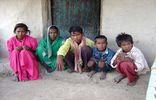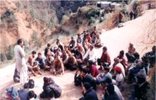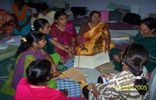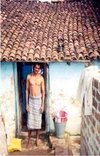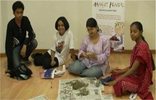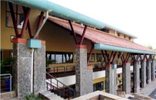24 June 2005 - Sanu Ghosh was around one and a half years old when a visit to SSKM Hospital in Kolkata to treat an attack of pneumonia saw him diagnosed as a patient of cerebral palsy. But then, his daily wage-earning parents from the rural outskirts of the city could hardly have been expected to arrange for the necessary rehabilitation of their little son. Fortunately for them, the Society for Appropriate Rehabilitation for the Disabled (SANCHAR) traced him out when he was four, and even detected a hip dislocation that nobody had noticed until then. Today, not only does Sanu attend school, but can manage to seat himself there, thanks to a chair designed by SANCHAR. A similar contraption for his home enables him to manage his daily domestic chores. At school, he uses his mouth to hold a pencil to write, and can read and write nearly as well as any child of his age.
Arup Sani was struck with polio at the age of three, resulting in the impairment of his left leg and right hand. The son of daily wage earning parents belonging to Krishnarampur village in South 24-Parganas, Arup was adopted by SANCHAR when seven years old. The provision of calipers and crutches under the government's scheme enabled Arup to attend the village primary school. Arup is now 19, and studying at the higher secondary level. He is not only getting educated, but also teaching three hearing impaired children from the neighbouring village. Besides, Arup is helping a visually challenged child, Mafijul, studying in the second grade, as a writer during the latter's exams.
Very few people can identify 21-year old Sujata as a disabled young woman, given her confidence. And yet, Sujata could hardly move ever since she was struck with polio at one and a half years. Thanks to SANCHAR's home-based programme, Sujata not only helps her family make puffed rice for sale, but has taken advantage of the vocational training imparted to be able to stitch her own dresses. She is currently learning embroidery even as she broadens her knowledge of dressmaking to earn an income.
These are but examples of the work taken up by SANCHAR on behalf of more than a thousand disabled persons in rural areas. Starting in 1988, SANCHAR launched itself with field support from CINI (a non-governmental organization working in the field of health) to work with disabled children. At first, there were only three or four children that the organization worked with, in a couple of villages. Today, SANCHAR operates in 75 villages spread over 4 blocks - Falta, Bishnupur I and II, and Thakurpukur-Maheshtala, bringing assistance to 819 disabled persons and 774 families. It has been a long journey, but as Director Tulika Das concedes, "The Disabilities Act of 1995 has proved a shot in the arm. With so much being offered by the government now, it is not too difficult to convince communities and Panchayats to take the initiative and give a fairer deal to the disabled."
The organization works at three levels: the disabled individual, his/her family and the community. At the family level, SANCHAR personnel provide the necessary training to the parents and family-members as regards handling of a physically or mentally challenged child. Physiotherapy is provided for free by a professional to enable the child to handle his/her own chores. In cases where a child is unable to move out of the home to attend school, SANCHAR personnel actually arrange for the child's education at home.
"The Disabilities Act of 1995 has proved a shot in the arm. With so much being offered by the government now, it is not too difficult to convince communities and Panchayats to take the initiative and give a fairer deal to the disabled."
Editors' Note: The author has separately compiled a list of key facilities that can be accessed under the
provisions of the Disability Act; click here to access this
page.
 The community-based rehabilitation programme involves sensitizing villagers through villager education committees, members of which comprise Panchayat pradhans and members of the Panchayat, liaising with school authorities to provide the necessary facilities such as ramps and suitable chairs for the challenged and allowing clinics to be operated for their benefit. SANCHAR also facilitates the provision of identity cards, stipends and the like by getting Panchayat pradhans to apply and arrange for the same. Wheelchairs, hearing aids and appliances are given free by the government to all those whose incomes are below Rs 5000 a year. "All that we do is spread awareness among the persons in the village community about the facilities available", says Das. Tying up with Mobility India for the past two years has also helped Sanchar in this respect.
The community-based rehabilitation programme involves sensitizing villagers through villager education committees, members of which comprise Panchayat pradhans and members of the Panchayat, liaising with school authorities to provide the necessary facilities such as ramps and suitable chairs for the challenged and allowing clinics to be operated for their benefit. SANCHAR also facilitates the provision of identity cards, stipends and the like by getting Panchayat pradhans to apply and arrange for the same. Wheelchairs, hearing aids and appliances are given free by the government to all those whose incomes are below Rs 5000 a year. "All that we do is spread awareness among the persons in the village community about the facilities available", says Das. Tying up with Mobility India for the past two years has also helped Sanchar in this respect.
"We especially provide technical know-how for the building of school ramps. The incline should never be too steep, lest the wheelchair user rolls down." It is to the credit of SANCHAR that nearly all schools in the 4 blocks in which it works have ramps to cater to the disabled, whereas most educational institutions and libraries in Kolkata lacking these, despite government funds being available for the purpose.
Rehabilitation through vocational training is what SANCHAR has especially been working towards when dealing with the disabled. Here, training is imparted in vocations that complement the traditional occupations prevalent here. For instance, brush-making being a common cottage industry here, many mentally challenged youngsters have been trained in the vocation. The hearing or visually impaired youngsters interested in starting on a new enterprise have been imparted training in making packing boxes for these brushes.
Sometimes, interest and talent may also determine the kind of training given. Physically challenged Krishna, for instance, always showed an uncanny talent for needlecraft since childhood. After being given the necessary training, Krishna has been taking on embroidery jobs to cater to the market and is earning a steady income. He is also training some others in the village to help him in the business.
SANCHAR
Director: Tulika Das
A-2/6 Diamond Park, Joka,
Kolkata 700104,
West Bengal.
Tel: 91-033-24975625.
e-mail: sanchar@vsnl.com
 Not resting on its laurels thus far, the organization looks forward to changing the negative attitude of communities with regard to the disabled. The low priority to the disabled in national planning is also a matter of concern to SANCHAR. "It is important that disability figures on the agenda of all development plans formulated by the government in this country," emphasizes Tulika Das. For now, the organization is busy reaching out to prevent the occurrence of disability and help in rehabilitation of the disabled in as many villages as possible-including those outside its field area - through Open Day programmes.
(Charkha Features)
⊕
Not resting on its laurels thus far, the organization looks forward to changing the negative attitude of communities with regard to the disabled. The low priority to the disabled in national planning is also a matter of concern to SANCHAR. "It is important that disability figures on the agenda of all development plans formulated by the government in this country," emphasizes Tulika Das. For now, the organization is busy reaching out to prevent the occurrence of disability and help in rehabilitation of the disabled in as many villages as possible-including those outside its field area - through Open Day programmes.
(Charkha Features)
⊕
Rina Mukherji
24 Jun 2005
Rina Mukherji is a freelance journalist, interested specifically in social and development issues.
Write the author
Disability
Health
West Bengal
Feedback:
Tell us what you think of this page
View letters to the editors

